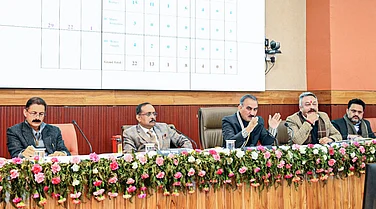President Droupadi Murmu on Tuesday hailed Goa’s "common civil code" in Goa, voicing in favour of a Uniform Civil Code (UCC) that the Union government has been proposing for the country. UCC has been a matter of debate for the past several months and has received criticism from several experts, as well as the Opposition.
President Murmu said that the common civil code was a matter of pride for Goa and a good example for the country.
The Portuguese, before they left their occupied regions in India, implemented a Portuguese Civil Code of Goa and Daman & Diu. The colonial-era code is still in force in Goa and Daman & Diu, making these the only state/UT which follows a civil code. The Portuguese civil code is applicable to people of all religions.
President Murmu hailed the code noting how in Goa, women enjoy equal status. The president was in the coastal state for a three-day visit and was responding to a civic reception hosted for her at Raj Bhavan.
“The number of women students in higher education in Goa is more than 60 per cent, but there is a need to increase the participation of women in the workforce in the state,” she said.
"It is a matter of pride for Goa that the people here have adopted a common civil code," she added.
“The common civil code which provides equal rights to women and men of all communities living in Goa is an example of the cosmopolitan culture here,” President Murmu added. It was in line with the Constitution and a good example for the country, she said.
On a national front, the proposed Uniform Civil Code came under the spotlight recently when the Law Commission sought views of various stakeholders on the issue. The BJP at Centre has also been pitching for UCC at public events ahead of the Lok Sabha elections in 2024.
Implementation of the common code has also been part of the BJP's election manifestos. Karnataka, Assam, Madhya Pradesh, Maharashtra, Gujarat, Uttar Pradesh, Uttarakhand and Haryana are among the states that have pitched for UCC.
By definition, UCC means having a common law for all citizens of the country regardless of their religion. Personal laws and laws related to inheritance, adoption and succession are likely to be covered by a common code.




















.png?w=200&auto=format%2Ccompress&fit=max)





